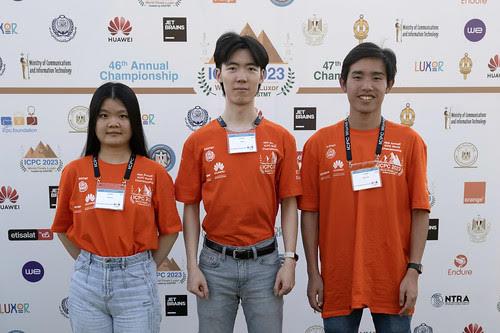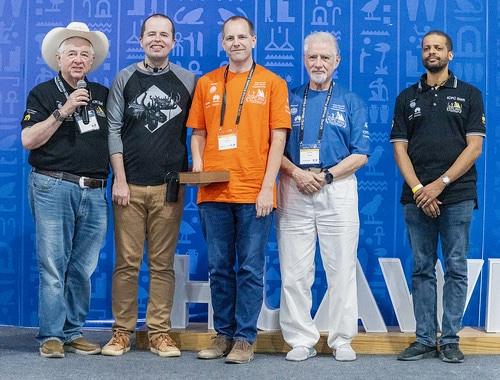
Students on the UTPC team (Left to right) - Ruoshi Dai (’23, M.S.) Jiawei Li (current Ph.D.), and Stanley Wei (’23, Turing Scholar)
This past month, UTPC competed at the International Collegiate Programming Contest (ICPC) World Finals hosted by the Arab Academy for Science, Technology and Maritime Transport in Luxor, Egypt.
The competition consisted of teams from 124 regions (approx. 372 students) trying to solve 11 problems in 5 hrs. The first-place team, Peking University, solved 10 problems. The second-place team, M.I.T., solved 9 problems.
UT solved 6 problems and came in 53rd place, 9th place in North America.
Teams consist of three students. The students on the UTPC team were Jiawei Li (current Ph.D.), Ruoshi Dai ('23, M.S.), and Stanley Wei ('23, Turing Scholar). The faculty coaches were Professor Etienne Vouga and Professor Glenn Downing.

In addition, Prof. Vouga and Prof. Downing were awarded The ICPC Foundation Coaching Award for excellence in coaching, having advanced to the ICPC World Finals for 5 or more years.
UT has been competing since 1997. UT went to the 2016-17 World Finals in South Dakota, the 2017-18 World Finals in Beijing, the 2018-19 World Finals in Portugal, and the 2019-20 World Finals in Moscow.
UT has seen marked improvement since creating a new elective, CS104c: Competitive Programming in 2014, taught by Prof. Vouga and Prof. Downing and the student officers of the UT Programming Club.
The ICPC traced its roots to 1970 when pioneers of the Alpha Chapter of the UPE Computer Science Honor Society hosted the first competition. The initiative spread quickly within the United States and Canada as an innovative program to increase students' ambition, problem-solving aptitude, and opportunities in computing.
Over time, the contest evolved into a multi-tier competition, with the first championship round conducted in 1977. Since then, the tournament has expanded into a worldwide collaboration of universities hosting regional competitions that advance teams to the annual global championship, the ICPC World Finals.
The International Collegiate Programming Contest (ICPC) is the premier global programming competition conducted by and for the world's universities. The ICPC is part of the ICPC Foundation.
The contest fosters creativity, teamwork, and innovation in building new software programs and enables students to test their ability to perform under pressure. The tournament has raised the aspirations and performance of generations of the world's problem solvers in the computing sciences and engineering.
Article written by Prof. Glenn Downing



